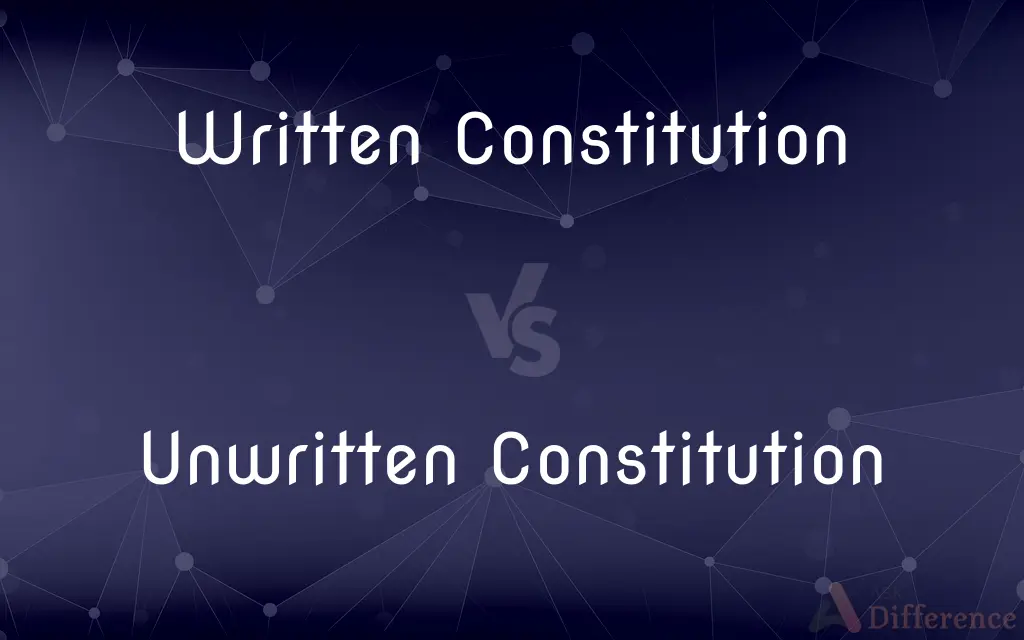Written Constitution vs. Unwritten Constitution — What's the Difference?
Edited by Tayyaba Rehman — By Fiza Rafique — Published on December 6, 2023
A Written Constitution is codified and formally documented, while an Unwritten Constitution relies on customs, traditions, and legal precedents.

Difference Between Written Constitution and Unwritten Constitution
Table of Contents
ADVERTISEMENT
Key Differences
A Written Constitution refers to a formal document or series of documents that outline the structure, powers, and limits of a government. Such a constitution is deliberately crafted and formally ratified. In contrast, an Unwritten Constitution isn't documented in a singular form but emerges from customs, traditions, and historical documents over time.
The foundation of a Written Constitution is its explicit and unambiguous nature, offering clarity and stability. Every provision, right, and duty is set down in clear terms. On the other hand, an Unwritten Constitution tends to be more flexible, deriving its principles from diverse sources like legal decisions, historical writings, and longstanding customs.
For those governed by a Written Constitution, the document serves as a direct reference for any constitutional query. Changes to this constitution typically require special amendment processes. However, nations with an Unwritten Constitution might find their foundational principles evolving more organically, adapting to changing norms and judicial interpretations.
Countries with a Written Constitution have the advantage of a tangible, authoritative source for legal and civic guidance. This provides consistency in governance. Conversely, an Unwritten Constitution, being a product of evolving traditions and interpretations, can more easily adapt to changing societal values without the need for formal amendment.
The rigidity and clarity of a Written Constitution can be both its strength and weakness, as it might resist rapid change even when necessary. On the flip side, the adaptability of an Unwritten Constitution might be seen as its advantage, but its vagueness can sometimes lead to legal ambiguities.
ADVERTISEMENT
Comparison Chart
Nature
Codified and documented.
Based on customs, traditions, and legal precedents.
Flexibility
Typically rigid and requires formal amendments.
More flexible and evolves organically.
Clarity
Clear, explicit provisions.
Might contain ambiguities due to evolving interpretations.
Source of Authority
Derived from a formal ratification process.
Derived from historical documents and traditions.
Adaptability to Changing Societal Norms
Might resist rapid change.
Easily adapts without the need for formal amendments.
Compare with Definitions
Written Constitution
A tangible record of a nation's foundational principles.
The rights of citizens are often enshrined in a Written Constitution.
Unwritten Constitution
Governance based on longstanding customs rather than a formal charter.
While not documented, the Unwritten Constitution holds significant legal weight in some countries.
Written Constitution
A ratified document detailing governmental structure.
Upon its founding, the country established a Written Constitution to guide its governance.
Unwritten Constitution
Foundational rules emerging from historical practices.
Some nations rely on an Unwritten Constitution, valuing tradition over codification.
Written Constitution
A documented charter outlining a nation's foundational laws.
The U.S. Constitution is a prime example of a Written Constitution.
Unwritten Constitution
A set of laws not codified in a singular document.
Legal decisions often reference the Unwritten Constitution for guidance.
Written Constitution
A formalized set of principles governing a state.
Many nations have adopted a Written Constitution to provide legal clarity.
Unwritten Constitution
Governing principles derived from traditions and precedents.
The UK operates primarily on an Unwritten Constitution.
Written Constitution
An official and codified source of fundamental laws.
The Written Constitution serves as a reference for legal disputes.
Unwritten Constitution
A fluid set of norms guiding a nation, without formal documentation.
The evolving societal norms influence the interpretations of an Unwritten Constitution.
Common Curiosities
What's the primary source of a Written Constitution?
A Written Constitution is sourced from a formal, codified document.
Which offers more legal clarity: a Written or Unwritten Constitution?
A Written Constitution typically provides more explicit legal clarity.
Can an Unwritten Constitution change over time?
Yes, it evolves organically with societal norms and judicial interpretations.
What's a key advantage of an Unwritten Constitution?
Its flexibility and adaptability to changing societal values.
How is an Unwritten Constitution typically formed?
It's formed from customs, traditions, and legal precedents over time.
Can a country have both a Written and Unwritten Constitution?
Yes, some aspects can be codified while others are understood through tradition and precedent.
How is a Written Constitution typically amended?
Through special amendment processes defined within the constitution.
How does an Unwritten Constitution gain legal weight?
Through consistent practice, legal decisions, and acceptance over time.
Which is more resistant to rapid changes: Written or Unwritten Constitution?
Written Constitutions are generally more resistant due to formal amendment processes.
Are most modern nations governed by a Written Constitution?
While many nations have a Written Constitution, some like the UK still operate largely on an Unwritten Constitution.
Share Your Discovery

Previous Comparison
6 vs. 6X
Next Comparison
Abridged Books vs. Unabridged BooksAuthor Spotlight
Written by
Fiza RafiqueFiza Rafique is a skilled content writer at AskDifference.com, where she meticulously refines and enhances written pieces. Drawing from her vast editorial expertise, Fiza ensures clarity, accuracy, and precision in every article. Passionate about language, she continually seeks to elevate the quality of content for readers worldwide.
Edited by
Tayyaba RehmanTayyaba Rehman is a distinguished writer, currently serving as a primary contributor to askdifference.com. As a researcher in semantics and etymology, Tayyaba's passion for the complexity of languages and their distinctions has found a perfect home on the platform. Tayyaba delves into the intricacies of language, distinguishing between commonly confused words and phrases, thereby providing clarity for readers worldwide.
















































